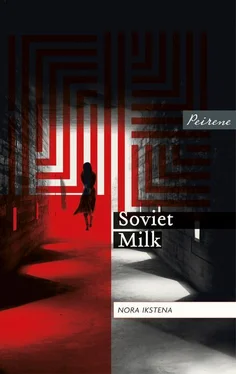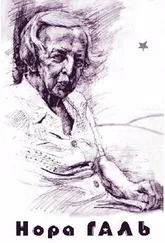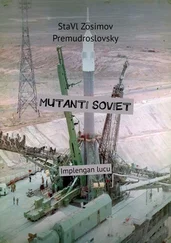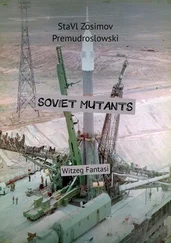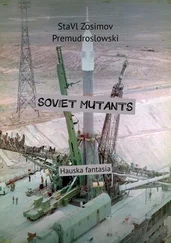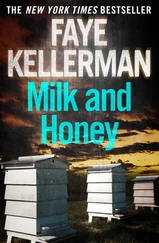Angered at my helplessness, I punched the clumsy baby into a lump again and tried anew. Everyone else was shaping the usual charming dishes and animals. Once more I kneaded out a smooth ball, rolled it on the table and made a lovely curved shape, much as the instructor had done previously. I was afraid to handle it further, afraid to blunder again and find another clumsy baby in my hands. I gazed at the smooth, mute shape. Would I be able to breathe life into it? The instructor was already coming to inspect our work and to correct what we had done. I didn’t have the courage to touch my curved shape any more.
I stood there with my hands tightly fisted. I could do nothing for myself, nothing for the clay baby, who lay on the table unborn. Frustrated, I decided to destroy it altogether. I stamped my fist into the curved shape. The instructor came over and said, ‘I see you’ve managed to do it.’ I gazed at the three-part chrysalis. The outline of a tiny human being was clearly discernible. It wasn’t as precise as my mother’s drawing, but it was there. I gave it to my mother. I think she hid it somewhere. At least I never noticed it anywhere at home after that.
I was sorry that my mother had hidden the clay baby. I thought of it as a magic baby because that evening, coming home from the ceramics workshop, I felt an odd, new pain in my groin. Suddenly I needed to pee. I knelt behind a bush, pulled down my knickers and noticed a streak of blood in them. I wasn’t afraid; my mother had told me that this would happen one day and that afterwards it would happen every month.
I told my mother that I was menstruating much later. It came with great pain and made me faint a couple of times in school. The clay baby had brought new times.
*
My daily walk to the ambulatory centre led past our village’s Lutheran church, which housed a book archive. This church had been lucky: elsewhere churches had been either demolished or reappointed to suit the needs of the kolkhoz – they became storehouses for fertilizers and animal feed. My parents never talked about God. No one talked about Him because it had been clearly announced: He didn’t exist. I had just one childhood story for a proof of His existence.
Once my grandmother came to visit us and I was left in her care for the evening. She was making a buberts – a sweet concoction of beaten egg, cream of wheat and milk floating in cranberry sauce. While she cooked, she described how, as a child, bundled in blankets and furs, she had been made to sit out in a sleigh on a cold winter night. The small bells fixed to the harness had tinkled and the horse had drawn the sleigh to church. There, still wrapped in blankets, she had been carried into the church. While the minister was preaching, she had seen a man dressed in light, summer clothes in the dark outside the church window. Surely He had been God. Later he had been seen lying in a ditch, under a church window frame with its pane intact. No one had had the courage to go near him to see if he was alive or dead.
I still haven’t had the opportunity to meet Him. That’s what I in my student naiveté had said to the old professor, who, of course, reported my ambiguous comment to his superiors. As I had responded to my Engels Street interrogator, I didn’t believe in God. But I thought about Him more and more frequently. About whether God was or wasn’t there when Serafima and my other patients became pregnant, lying on this outdated examination chair made of cracked fake leather, their legs in stirrups of cold, uncomfortable metal. No one and nothing gave me the slightest sign that He was there. How could I feel anything of His existence? Everything or almost everything could be explained without His presence.
She came by chance. It was evening and consulting hours were nearly finished. A quiet knock at my door. ‘Come in,’ I said. She looked very much like Serafima – her head was wrapped in a large shawl and she didn’t speak Latvian. She sat down shyly on the couch. For many months now she had suffered back and lower stomach pains. She had tried not only teas but also ointments and prayers – nothing had helped. She no longer had the strength to tolerate the pain.
Still in her shawl, she clambered onto the examination chair. I asked her to remove her vest and blouse and to raise her brassiere. Over her breasts she clasped her cross – like the one that Serafima wore – and allowed herself to be examined.
I had only to see her nipples and all was clear. They had drawn inward. Her right breast and her underarm region were full of lumps. She hadn’t seen a female doctor for almost fifteen years.
‘You have to go to the city right away for more detailed tests. These will doubtless be followed by an operation,’ I said.
‘Is it cancer?’ she asked.
‘Most likely it is, but it could be something else,’ I answered. ‘The sooner you get to a hospital, the better.’
‘I’ve never been in a hospital,’ she said as she got dressed. It was impossible to tell her age. Her face naive and childlike, her skin smooth, her hands work-worn and deeply veined.
‘Maybe I’ll still try with prayers,’ she said.
‘I very strongly recommend you don’t drag this out but go straight to a hospital,’ I said in a strict voice.
‘Doctor, do you believe in God?’ she asked.
‘I still haven’t had the opportunity to meet Him,’ I repeated. An odd sensation gripped my stomach.
‘What a pity. It’s one of the most beautiful meetings in life. Love and fidelity for a lifetime. A friend who always supports and forgives you.’
What she said seemed to me naive and exaggerated. Through my clairvoyant eyes I saw her cancer-riddled body, which, most likely, could no longer be helped either by an operation or by God.
‘Come,’ she said. ‘Through the woods, on a hill above the river, is a small Orthodox church. There are no windows, it’s boarded up, but you can pray quietly there. No one goes there. It’s safe.’
I had never heard of this small church.
‘Come on Sunday morning. I’ll read a prayer.’
It was an empty Sunday without my daughter. It had snowed heavily and the walk through the woods was not easy. We never walked in that direction. A path trampled by animals led along the edge of the forest. It gradually narrowed to no more than a snow-covered trail. On the other side of the trail nestled a river in its winter sleep. It seemed incredible that a church could be here. Soon its silhouette rose through the trees. Two small, round cupolas. Effectively there were no windows, as they’d been boarded up. The door was half-open. In the darkness inside, lit by flames from tapers, a subdued voice was chanting. A candlelit icon was propped up high on the dilapidated altar: the Mother of God, with a halo of light around her head and a child in her arms. A woman stood facing the icon and chanting from a small book. I didn’t understand the words. They washed over me like a wave:
О, Пресвятая и Преблагословенная Мати Сладчайшаго Господа нашего Иисуса Христа! Припадаем и поклоняемся Тебе пред святою и пречестною иконою Твоею, еюже дивны и преславны чудеса содеваеши, от огненнаго запаления и молниеноснаго громе жилища наша спасавши, недужныя исцеляеши и всякое благое прошение наше во благо исполняеши. Смиренно молим Тя, всесильная рода нашего Заступнице, сподоби ны немощныя и грешныя Твоего Матерняго участия и благопопечения…
Читать дальше
